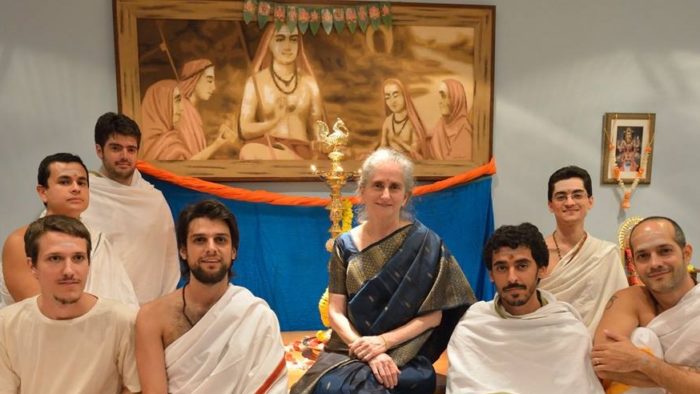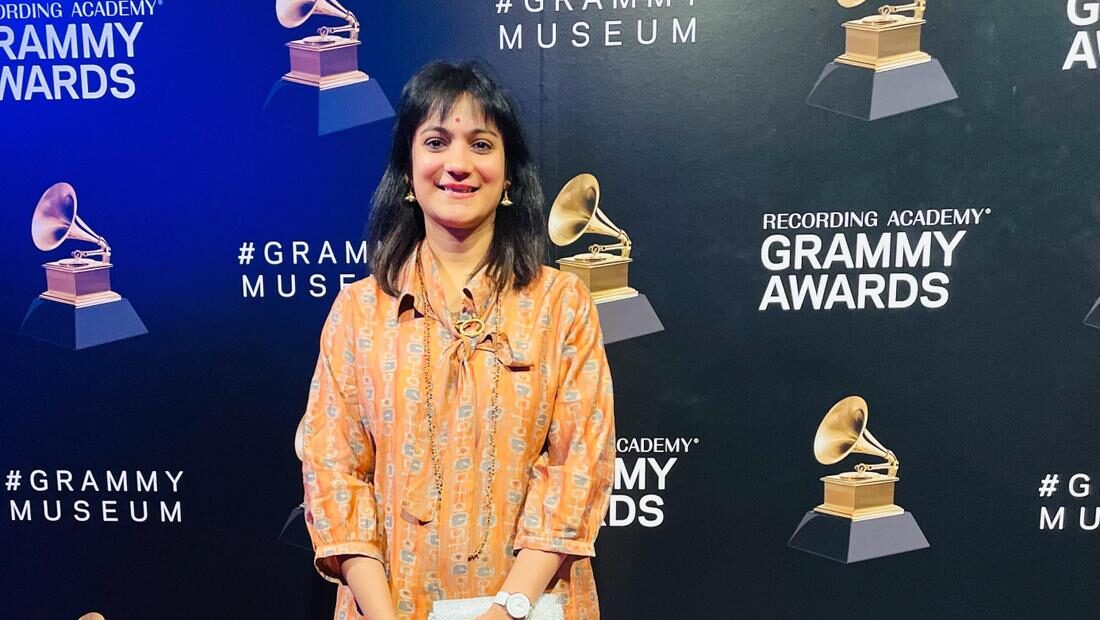On being awarded the Padma Sri this year, Brazilian Vedanta and Sanskrit scholar Gloria Arieira says the award belongs to “all of us from this sampradaya”.
She quotes:
Sadashivasamarambham shankaracaryamadhyamam
Asmadacaryaparyantam vande guruparamparam
In the 1970s, Gloria says she was “eager to understand about myself, the world and god. No philosophy or religion made sense to me,” until Swami Chinmayananda accepted her and welcomed her when she met him and attended two of his talks when he came to Brazil in 1973 and later when she visited India in 1974. “Even though I was very young and western, not knowing anything about India or Vaidikadharma, he received me and allowed me to be part of the on-going course at Sandeepany Sadhanalaya, Mumbai. He taught me to focus on what was most important for me and bear with what was secondary, if necessary. He taught me that people will mostly criticize us but that is ok. Adversities give us strength and helps us define what are our priorities and to work for them. All along he supported me and trusted I would do well,” she writes in her blog.
Her second guru, Swami Dayananda Saraswati taught her all she knows about Vedanta and Vaidikadharma, “the most precious lessons on Ishvara and our basic relationship with Ishvara which we carry on on all other relationships. Swamiji taught me that Veda is a pramanam, a specific means of knowledge, and therefore it is for everyone independent of background. He taught me Satyam Brahman but also brilliantly made me understand that Brahman is easy to know, to understand Ishvara and bring Ishvara to one´s life is the most difficult, and that makes a big difference in one´s life. Swamiji made me appreciate, understand and love Sri Shanakara and his bhashyams.”
Thanking her family and friends, Gloria says the award also belongs to her Guru bhais from the Sampradaya. “We, as students of the same teachers, are equal in blessings from our sampradaya. We are all blessed by the teachings and the teachers. But, as I was not born in India, in Vaidikadharma, I may look special, but it is not different from what is been done by many people of our sampradaya. The award belongs to all of us from this sampradaya.”

For Gloria, Vedanta is a “clear means of knowledge about the immutable reality - that is myself, the world and god at the same time. To understand this clearly we have to go for the study of the Upanishads because Vedanta is Upanishads, the last part of the Vedas. Vedanta teaches about the one reality, but at the same time makes one understand that there is an Order that is infallible, and that Order governs everything. This understanding changes one´s attitude towards oneself and everything else. The study of Vedanta made me understand and accommodate my humanity and the whole world as it is, doing always the best I can.”
After returning to Brazil, Gloria began, in 1979, teaching in Portuguese language all that she had learned in India. A few years later, in 1984, with the support of a few students, Vidya Mandir was founded. “At Vidya Mandir we keep Vaidikadharma alive through puja, annual festivals of the Hindu calendar, telling the stories of Mahabharatam, Ramayanam and Bhagavatam and enacting them, chanting and other activities, besides always inviting significant people from India to come to Brazil so people here can appreciate how Vaidikadharma is alive,” Gloria told CSP.
In her blog titled, The Knowledge of Brahman that is Ishwara, Gloria writes about the path to Ishvara, whose form is hidden from us. “At first, there will be religion with a specific concept of god; in the second, a fuller and deeper understanding of god. And, finally, it may lead to the realization of Brahman's unchanging reality and, consequently, to the understanding of the perishable and changing reality that is Ishvara, through the power to create, maintain and transform that is Maya. The expression of Maya has beauty and enchantment. What is unchanging, but at the same time the basic truth of all that exists, is Brahman – the one who has no form or qualities is nirguna and arúpa, and at the same time is inherent in all that exists.”
Every Friday at Vidya Mandir, there is a puja to Saraswati performed by Professor Henrique Castro, who deepened his knowledge of Vedanta in southern India with Pujya Swami Dayanandaji and other Swamis. All the festivals in India are celebrated at this ashram in Brazil including: Makara Sankaranti, Mahashivratri, Rama Navami, Hanuman Jayanti, Shankara Jayanti, Narasimha Jayanti, Gurupurnima, Krishna Janmashtami, Ganesh Chaturti, Navaratri, Saraswati Puja, Durga Ashtami, Vijaya Dashami, Deepavali, Gita Jayanti and the end of the year Satsang.
Gloria's translation and commentary of the Bhagavad Gita has been translated into English and is available by India's oldest publisher of Indology books, Motilal Banarsidas. She has also translated a lot of the scriptures into Portuguese. Asked about how she translates texts, she says: “It took me some time first to choose words to use as I began translating from the Sanskrit into Portuguese. Even though I use words in translating from Sanskrit, my aim is to explain the meaning of the words and not only give a single word as a translation. Many times I explain the word and use it in Sanskrit itself.”
On her interest in Sanskrit as a language and as the key to the Veda, Gloria says that in her studies with her guru Swami Dayananda, Sanskrit knowledge was emphasized to understand the shastra, the Veda. “It is important to see for ourselves what shastram says as the teacher is analysing each Vedanta text.”
Gloria has spread Vedanta in Brazil for over four decades now. She says, “Vedanta deals with the sufferings and sense of limitation and inadequacy peculiar to a human being. Vedanta recognizes this fundamental human problem, but says it comes from not understanding our real nature. So, in the light of Vedanta, the human problem is due to ignorance about oneself and the world, and the solution is knowledge. Therefore Vedanta helps all human beings, independent of their origin, place and time of birth, in clearly understanding the fundamental problem and going for a proper definite solution.”
She says Vedanta helps in dealing with day to day existential issues by giving students, “a very objective mind capable of inquiry and focus in studies and in daily life and relationships.”
The Shankara Sampradya was sustained by Swami Dayanand Saraswati, who Gloria says would teach “with impressive profundity creating an unforgettable impact on his audience of common people as well as of students.”
Gloria explains, “To explain nirguna Brahman in a saguna world he would pretend a big clay pot would be talking to a small clay pot. And he would have two pots on his hands. The big wise pot would say, among many other things: you may feel small but that is because you have not understood that you are clay only and not pot. There is no reality in pot, it is clay all over. See, if I would keep clay and give you pot, what would you have? Nothing really. Clay is satyam, pot is mythya only; though it holds water! The dialogue would be very funny but would take home what he wanted to explain.”
This year, starting with the bestowing of the award, will continue with Gloria Ariera's translation and commentary on the Yoga Sutra of Patanjali in the light of Vedanta, as well as the e-book of her Bhagavad Gita translation.





